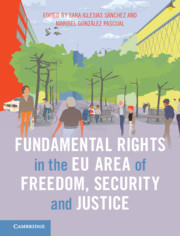Book contents
- Fundamental Rights in the EU Area of Freedom, Security and Justice
- Fundamental Rights in the EU Area of Freedom, Security and Justice
- Copyright page
- Dedication
- Contents
- Contributors
- Foreword
- Preface
- Common Abbreviations
- Introduction Fundamental Rights at the Core of the EU AFSJ
- Part I The General Framework for Fundamental Rights Protection in the AFSJ
- Part II Asylum, Migration and Borders
- Part III Judicial Cooperation in Civil Matters
- Part IV Judicial Cooperation in Criminal Matters and Police Cooperation
- 13 Mutual Recognition and Fundamental Rights in EU Criminal Law
- 14 The Right to Liberty and Security in EU Criminal Law
- 15 Defence Rights and Effective Remedies in EU Criminal Law*
- 16 Victims of Crime in the Area of Freedom, Security and Justice
- 17 The Principle of Legality in the Area of Freedom, Security and Justice
- 18 The Interpretation and Application of the Ne Bis In Idem Principle in the EU Area of Freedom, Security and Justice
- Part V Cross-Cutting Issues of Fundamental Rights in the AFSJ
- Index
13 - Mutual Recognition and Fundamental Rights in EU Criminal Law
from Part IV - Judicial Cooperation in Criminal Matters and Police Cooperation
Published online by Cambridge University Press: 06 August 2021
- Fundamental Rights in the EU Area of Freedom, Security and Justice
- Fundamental Rights in the EU Area of Freedom, Security and Justice
- Copyright page
- Dedication
- Contents
- Contributors
- Foreword
- Preface
- Common Abbreviations
- Introduction Fundamental Rights at the Core of the EU AFSJ
- Part I The General Framework for Fundamental Rights Protection in the AFSJ
- Part II Asylum, Migration and Borders
- Part III Judicial Cooperation in Civil Matters
- Part IV Judicial Cooperation in Criminal Matters and Police Cooperation
- 13 Mutual Recognition and Fundamental Rights in EU Criminal Law
- 14 The Right to Liberty and Security in EU Criminal Law
- 15 Defence Rights and Effective Remedies in EU Criminal Law*
- 16 Victims of Crime in the Area of Freedom, Security and Justice
- 17 The Principle of Legality in the Area of Freedom, Security and Justice
- 18 The Interpretation and Application of the Ne Bis In Idem Principle in the EU Area of Freedom, Security and Justice
- Part V Cross-Cutting Issues of Fundamental Rights in the AFSJ
- Index
Summary
The aim of this chapter is to cast light on the interplay between mutual recognition and fundamental rights in Europe’s area of criminal justice. Focusing particularly on the framework decision on the European arrest warrant, the chapter begins by placing the application of the principle of mutual recognition within the context of the objective of effective interstate cooperation in criminal matters. The chapter then examines the extent to which fundamental rights have emerged as a limit on automatic mutual recognition both in secondary EU law and in the case law of the CJEU. The chapter analyses the extent to which harmonisation of fundamental rights in EU secondary law can provide a basis for enhancing mutual trust and thus facilitate the operation of mutual recognition in criminal matters. In this manner, the chapter assesses the extent to which EU law has moved from ‘blind’ to 'earned' trust in Europe’s area of criminal justice.
Keywords
- Type
- Chapter
- Information
- Publisher: Cambridge University PressPrint publication year: 2021
- 1
- Cited by

